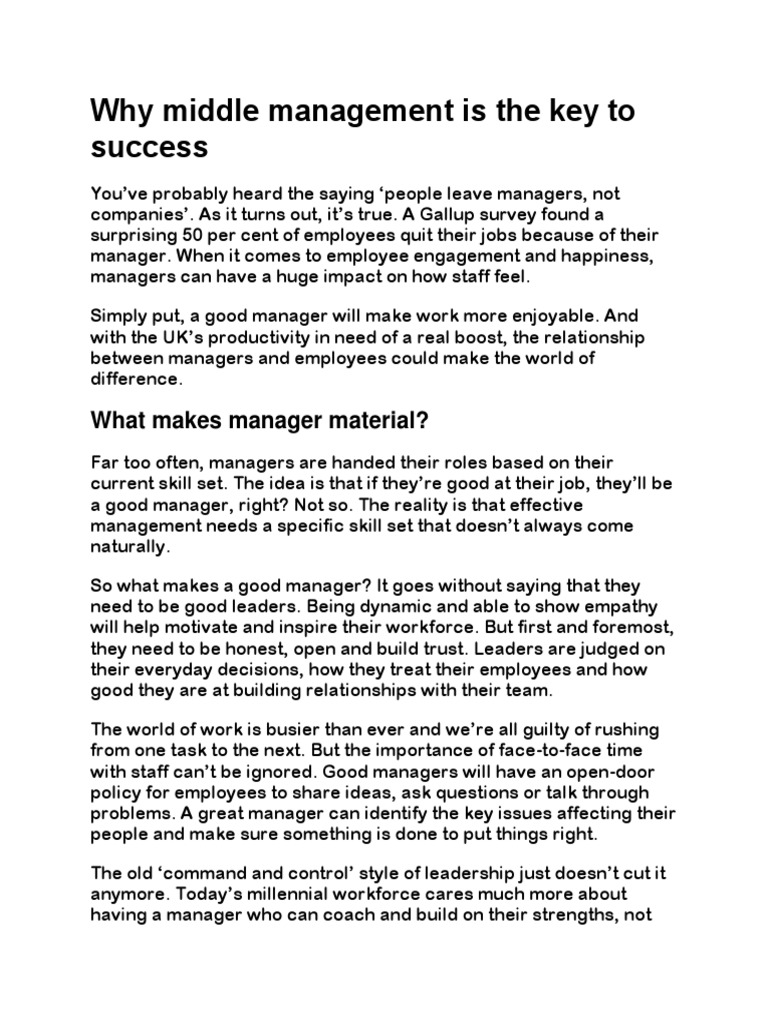How Middle Management Drives Organizational Success And Employee Development

Table of Contents
The Critical Role of Middle Management in Strategic Execution
Middle managers are the linchpin of strategic execution. They translate high-level strategic goals, often communicated by senior leadership, into actionable plans for their teams. This involves a deep understanding of both the overarching company vision and the specific capabilities and limitations of their individual departments. Effective middle management ensures that departmental activities align seamlessly with the overall organizational strategy, maximizing resource utilization and minimizing wasted effort.
- Developing and implementing departmental action plans: This requires careful planning, resource allocation, and the setting of clear, measurable goals. Middle managers must be skilled in project management and possess the ability to break down complex objectives into manageable tasks.
- Monitoring progress towards strategic objectives: Regular tracking of key performance indicators (KPIs) is crucial. Middle managers need to analyze data, identify areas needing improvement, and adapt strategies accordingly.
- Adapting strategies based on performance data and market changes: The business landscape is dynamic. Agile middle managers can adjust plans in response to changing market conditions and emerging opportunities, ensuring the organization remains competitive.
- Identifying and mitigating potential roadblocks to success: Proactive problem-solving is essential. Middle managers need to anticipate potential challenges and develop contingency plans to ensure smooth execution of strategic initiatives.
This efficient execution significantly impacts the organization's bottom line and competitive advantage. Strong middle management ensures that strategic initiatives are not just planned, but successfully implemented, leading to tangible results.
Fostering Employee Development and Talent Growth
Middle managers are instrumental in identifying and nurturing talent within their teams. They act as mentors and coaches, guiding employees towards their full potential and contributing significantly to talent development. Investing in employee growth is not merely a matter of human resources; it's a strategic imperative that directly impacts organizational performance.
- Conducting performance reviews and providing constructive feedback: Regular feedback sessions provide opportunities for both praise and improvement suggestions, fostering a culture of continuous growth.
- Identifying training and development needs for individual team members: Middle managers should actively identify skill gaps and recommend relevant training programs to address these needs.
- Creating opportunities for skill enhancement and career advancement: This includes delegating challenging tasks, providing mentorship opportunities, and advocating for promotions when merited.
- Mentoring and sponsoring high-potential employees: This involves guiding and supporting high-performing individuals, helping them develop their leadership skills and advance within the organization.
Investing in employee development boosts morale, reduces turnover, and builds a strong, skilled workforce. A committed middle management team actively cultivates talent, creating a virtuous cycle of growth and success.
Enhancing Communication and Collaboration
Effective middle management is crucial for fostering seamless communication and collaboration throughout the organization. They act as the vital link, ensuring that information flows freely between senior leadership and front-line employees, promoting transparency and understanding.
- Clearly communicating organizational goals and expectations: Middle managers translate the company's strategic vision into clear, concise goals and expectations for their teams.
- Regularly updating teams on progress and challenges: Open and honest communication about both successes and setbacks builds trust and keeps everyone informed.
- Encouraging open dialogue and feedback: Creating a culture of open communication encourages employees to share ideas, concerns, and feedback.
- Facilitating cross-functional collaboration and knowledge sharing: Middle managers bridge communication gaps between different departments, fostering collaboration and knowledge-sharing across the organization.
Transparent and effective communication fosters a positive and productive work environment. This minimizes misunderstandings, improves efficiency, and boosts overall morale.
Driving Performance and Employee Engagement
Middle managers directly impact team performance through effective leadership and motivational strategies. By creating a positive and supportive work environment, they boost employee engagement and productivity, leading to improved organizational outcomes.
- Setting clear expectations and providing regular performance feedback: Clear goals and consistent feedback provide direction and motivation for team members.
- Recognizing and rewarding employee achievements: Celebrating successes, both big and small, boosts morale and reinforces positive behaviors.
- Addressing employee concerns and resolving conflicts fairly: Promptly addressing issues and resolving conflicts maintains a positive work environment.
- Promoting a culture of collaboration and teamwork: Fostering a collaborative team spirit enhances productivity and job satisfaction.
High employee engagement leads to increased productivity, improved quality of work, and greater organizational success. A strong middle management team is vital in creating this positive and high-performing work environment.
Conclusion
Middle management plays a vital role in achieving organizational success and fostering employee development. By effectively translating strategic goals, nurturing talent, enhancing communication, and driving performance, middle managers are essential for creating a thriving and productive workplace. Investing in the development and support of your middle management team is investing in the future success of your entire organization. To learn more about strengthening your middle management and unlocking the full potential of your workforce, explore additional resources on effective middle management strategies and employee development programs. Develop your middle management team and watch your organization flourish!

Featured Posts
-
 Are Bmw And Porsche Losing Ground In China An Industry Analysis
Apr 26, 2025
Are Bmw And Porsche Losing Ground In China An Industry Analysis
Apr 26, 2025 -
 Nintendos Action Ryujinx Emulator Development Ceases
Apr 26, 2025
Nintendos Action Ryujinx Emulator Development Ceases
Apr 26, 2025 -
 Office365 Data Breach Hacker Allegedly Makes Millions Targeting Executives
Apr 26, 2025
Office365 Data Breach Hacker Allegedly Makes Millions Targeting Executives
Apr 26, 2025 -
 Open Ais Chat Gpt Under Ftc Scrutiny A Deep Dive Into The Investigation
Apr 26, 2025
Open Ais Chat Gpt Under Ftc Scrutiny A Deep Dive Into The Investigation
Apr 26, 2025 -
 Nintendo Switch 2 Preorder My Game Stop Queuing Experience
Apr 26, 2025
Nintendo Switch 2 Preorder My Game Stop Queuing Experience
Apr 26, 2025
